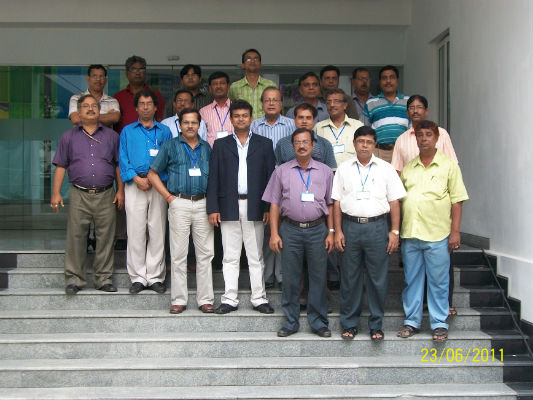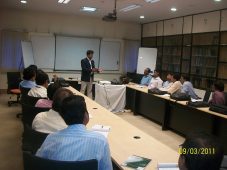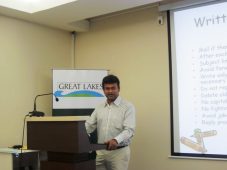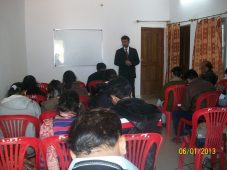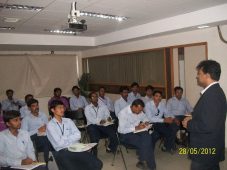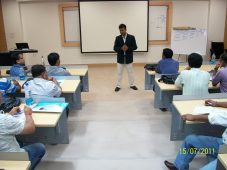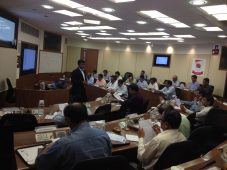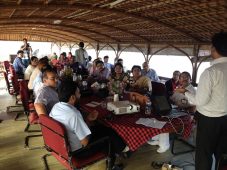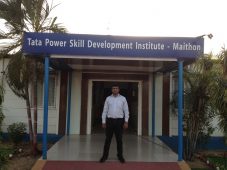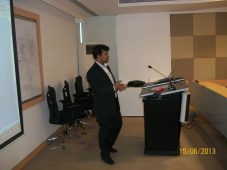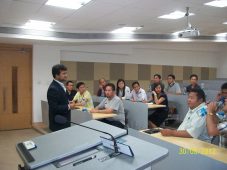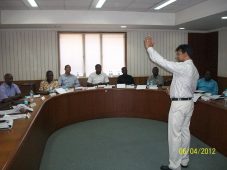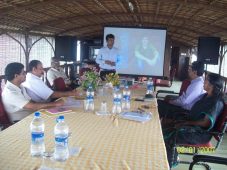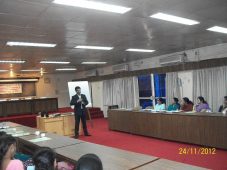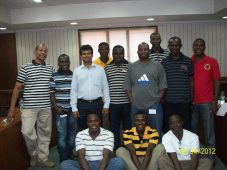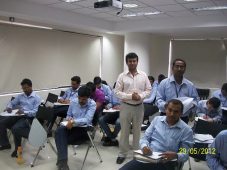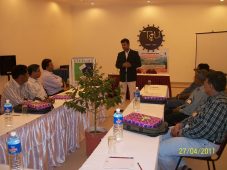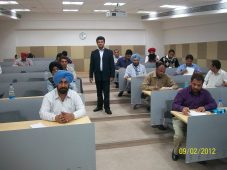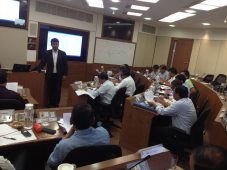We are Mumbai based Corporate Soft Skills Training services company, Providing Training Solutions in the Behavioural, Attitudinal, Psychology, HRD or Soft Skills arena. We have experienced soft skills trainers, training consultants, corporate trainers and freelance trainers on our panel. Our strength is that most of our trainers are from Psychology background. This makes more sense as soft skills training derives 90% of the concepts from Psychology.
We started operations in year 2000 and since then we are providing soft skills training and consulting services to our expanding clientele. Cogito Training and Counselling Center was nurtured, developed and promoted as an entrepreneurial venture by Prof. Praveen Singh and his team of Psychologists and Soft Skills Trainers, that achieved credit of exceeding 20,000 satisfied training participants falling under the category of senior executives of corporates, middle and lower management officers, supervisory level and technical staff. Our team has trained employees of Government, Public Sector Undertakings, Private and Multinational Companies. Our clientele covers sectors like oil and gas, petroleum, power, information technology, finance, automobile, hospitality, services, water transport, marine hospitality (cruise liners), academia (Schools & Colleges) and social & non-profit organizations etc.
Our freelance soft skills trainers team headed by Prof. Praveen Singh conducts open and in-house training workshops on various soft skills topics. You can hire soft skills trainers for your specific organisational training needs. Since fifteen years Prof. Praveen Singh has been active in conducting soft skills training programmes across industries. Employees from all levels including senior management, middle management and entry level have participated in his sessions.
Out of the many soft skills training topics that he has conducted, the following topics are most popular and often repeated. Click on any of the below soft skills training topics to find additional information / details. Alternatively, if you are interested in geting a custom soft skills training program for your organization’s specific needs, please call us and discuss your requirement with one of our professional soft skill trainers on +91-9869018775 or email us on cogito_pks@hotmail.com with our requirement details.
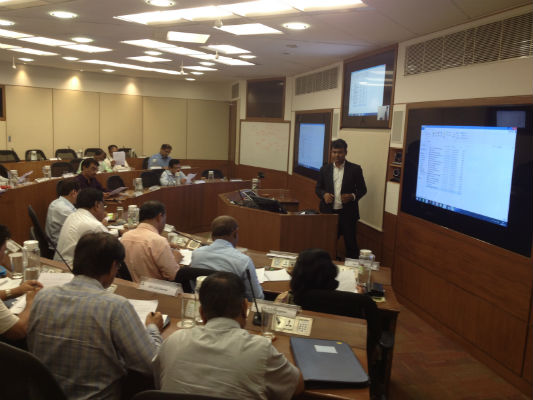
What We Do?
Corporate Soft Skills Training Solutions:
We provide soft skills training support to many businesses, training canters and institutions of learning. Our corporate trainers, design and deliver programmes for all levels and groups of people which includes, Sr. Management, Middle Management, Jr. Management, Supervisory Cadre, Workers, Professionals, Faculties & Teaching Staff, Management Students, Students(High School to PG level)
Soft Skills Training Topics We Cover:
We cover a plethora of soft skill training courses which help companies solve their soft skills requirement. Our soft skill training modules can be customized as per department’s or organization’s needs. Our soft skills training helps firms fulfill the for the following training requirements:
General Management Development:
Managerial Effectiveness, Supervisory Effectiveness, Workers Training, Campus to Corporate Induction Training, , Leadership Development, Soft Skills Development, Team Building, Interpersonal Relationships, Conflict Resolution, CRM(Customer Relationship Management), Training of Trainers(TOT), Faculty Development, Change Management, Interviewing Skills, Counselling Skills etc.
Special Topics:
Leadership Lessons from “Srimad Bhagvad Gita”, Importance of Values and Ethics – Wisdom of Scriptures, Psychology & Spirituality for Well-being, Managerial Grid Training, Health Management, Wealth Management, Power of Sub-Conscious Mind.
Employee Development:
Facing Interviews, Public Speaking, Presentation Skills, Personality Development, , Listening Skills, English Speaking, Communication Skills, Goal Setting, Time Management, Confidence Building, Attitudinal Change, Motivation, Stress & Anger Management, , Corporate Etiquette & Grooming, Assertiveness, Positive Thinking, Emotional Intelligence, Transactional Analysis etc.
Academic Topics:
HRM, Organizational Behavior, Organization Development, General Management, Training & Development, Organization Theory & Structure, Business Communication, Leadership & Teamwork etc.
Maritime Training Topics for STCW Courses, Value Added Courses.
- Master’s Upgradation – HRD for Mariners, Personnel Management on Board,
- PSSR – Communication on Board, Interpersonal Relationships on Board
- Social Responsibility, Helicopter Underwater Escape Training(HUET) – Distress/Panic Management, Role of Human Errors/Attitude in Accidents
- Deck Cadets – Communication, Teamwork, Interpersonal Relationships, Motivation etc.
- GP Rating Course, Passenger Ship Familiarization, TOTA, Maritime English
Common Soft Skills Training Topics:
An effective employee is one who is able to deal with his peers in a way which boosts their morale. His communication skills much be encouraging and motivating enough for him to win the loyalty and support of his subordinates. He should be a good team player and must be able to guide his team to success. For this it is said that he must have a high EQ.
EQ (Emotional Intelligence) which is also known as social intelligence is needed for good interpersonal competence and man management skills. Emotional Intelligence is an ability to sense the impact of his words, behaviour, actions and habits on people around him. This sense helps him adapt to the situation and change his ways to achieve trust, loyalty and support of his team members, family and friends.
It is said that a high IQ may help you in getting good education and knowledge but does not guarantee success in life or career. For success you need EQ. One of the competencies needed to have a good EQ is being open and sensitive to feedback. Technical competencies are primary for a trainee, but as he move up in career, and forms his team and has people reporting to him, his technical competencies become secondary and interpersonal relationship skills and man-management skills become primary.
Presentation skills is an ability to sell oneself and to create a desired image in the minds of the audience. To sell a product you have to first sell yourself. If a person is accepted, and appreciated, his product will sell for sure. Presentation gives us the opportunity to influence the attitude of our audience in our favor. Many professionals are smart enough to take full advantage of this opportunity and give their best, whereas many may dismiss this as support activity and lay the blame on the product or competition. Research shows that effective presentation skills gave that extra edge which made all the difference between successful and not so successful professional.
At personal level also, public speaking is one skill which sets people apart and gives them an edge over others. It can have a dramatic effect on your professional and private life. Public speaking is that art which adds luster to anyone’s personality. Often the difference between a manager and leader is the ability to present his views emphatically to a group. Success often comes to people who have excelled in public speaking and presentation skills. This programme offers a unique opportunity to people to master presentation skills by practice and feedback.
In any organization we see it’s relationship which helps it succeed. Organizations are made up of people. The success and failure of an organization largely depends on the power play among team interactions. Success is often attributed to a good leadership leading to fantastic teamwork. A good team work ensures efficient and effective use of the existing resource. This also helps achieve synergy which multiplies performances to unpredictable levels.
Relationships are not just good for organizations but also for an individual employee. With good relations an individual enjoys support; loyalty, timely help, information and trust which he needs to do well in his job. He also needs good references to succeed at work. Now it will be not possible to achieve these things if he doesn’t enjoy good relations with his team members. Thus even if he may be technically competent he will lose out, if he remain interpersonally incompetent
Technical competencies are primary for a trainee, but as he move up in career, and forms his team and has people reporting to him, his technical competencies become secondary and interpersonal relationship skills and man-management skills become primary.
Can we think of a team player or a team leader without good interpersonal skills? In this competitive world, key to survival is in your ability to manage people, motivate people, winning their support and getting things done. This is possible by learning team working and leaderships skills. For which we need to start with the basics of learning interpersonal relationships skills.
Ethics is the supreme good. It answers the question, “what is right”. In any given situation there can be three responses, first the right or correct response or technically right or legally right response. The second could be “my” response which is personal or driven by emotion, anger, jealously, greed or some ulterior motive. And the third can be the ethical response i.e. the right response. This is the response which is time tested and has passed the test of good values. If a business is driven by this value it can never go wrong.
This is ethics in business. Business stands for people, society and nation. Responsibility and accountability in business is ethics. People or customers are not ignorant any more. They keep a close watch and evaluate businesses on this parameter and then choose to associate. We have seen many examples where, businesses with ethics in their core values have survived all odds and are still going strong today whereas those who tried to cheat and fool became history.
Problem solving is a complex cognitive process which demands a systematic approach. A problem is sometimes very well defined and some times may not be defined at all. When we follow a systematic approach the probability of solving the problem increases and there is less time and energy needed. Usually the steps defined in problem solving involves identifying or defining the problem.
Identification of the problem is the key towards moving in the right direction. For this right analysis must be done. Feedback, brainstorming, data collection, past case studies must be used to understand the main issue.
After this various options, alternatives and solutions must be generated by use of creativity and out of the box thinking. Lateral thinking also helps in generating ideas. Then each idea must be evaluated to test its relevance and effectiveness.
Time Management is all about self management. We can never manage time. Time is beyond our control. To get the best out of our life, we must adjust our self with the available time in such a way that we are able to increase our efficiency and decrease our stress levels. Usually its our behavior and life style which is to be blamed for many of our time management related issues.
By bringing some changes in our life style and attitude along with following practical and technical guidelines, we can be better in managing our lives. We have limited time for our professional life, personal life and for self development and too many distractions. So here the key is to identify and prioritise our goals. Being clear, focused and disciplined is the mantra to get the best out of the limited resource of time.
Leadership is an art of influencing people. A good leader is one who has the ability to create and develop a team. Communicating, motivating, supporting and leading from front with the sense of accountability and ownership is what defines a leader. There are certain behavioral traits which can be developed and one’s effectiveness can be improved as a leader.
Another word which defines leadership is initiative. A leader is one who is confident and bold enough to take initiative and a stand. His passion and belief should be infectious. People feel secure with a leader and they follow such people; sometimes even blindly. So a true leader is one who can take decisions and is also accountable. It’s important for a leader to be ethical and fair if he wants to succeed and go a long way.
An effective leader is one who is able to deal with his people in a way which boosts their morale. His communication skills much be appreciating, encouraging and motivating enough for him to win the loyalty and support of his subordinates. He should be a good team player and must be able to guide his team to success. For this it is said that he must have a high EQ. EQ (Emotional Intelligence) which is also known as social intelligence is needed for good interpersonal competence and man management skills.
Success comes easy to people who are effective communicators. Communication skills talks about the ability to effectively & assertively express themselves to one and many. There is a difference between communication skills and language skills, or language proficiency. A person may be weak in a language but it is not necessary that he will be a poor communicator. Communication skills involves a lot of intelligence, patience, reading of the opposite person, situation and use of right worlds with right modulation at right time.
It can make or break a relationship, business or a career. Successful people are known to be great communicators. The only qualification a politician perhaps needs is his ability to communicate. Can be ever imagine a politician or a leader who is a poor communicator? The answer is mostly no.
Communication skills also involves platform and presentation skills i.e. ability to effectively address a group of individual and present their views. Communication is also about talking to people one to one to influence them, to motivation them, to negotiate with them, to give effective feedback, to persuade them, to resolve issues and conflicts and to solve problems. It’s about creating a positive self image, gain acceptance from people and influence the impression that others form about us.
In today’s time we also refer to this skill as communication etiquette. Communication skills also further extends to writing skills, e-mail etiquette and telephone etiquette.
Common Soft Skills Training Questions:
As per Dr Robert Blake and Jane Mouton of Managerial Grid theory fame, every organization builds resources and then convert it into results. The resources do not get converted into results on its own. It has to pass through arena of Relationships. In an organization, where relationships is not sound most of the resources get wasted.
This fact makes us think about correcting the situation and work on the non-technical aspect of working. It means organizations must not only work on sharpening their employee’s technical skills or functional skills but also their soft skills e.g., communication skills which also includes their language, politeness, courtesy, body language, listening, feedback etc. Their interpersonal skills, team working ability, conflict handling ability, trust, respect, tolerance, emotional intelligence etc. with
HRD departments now realize that it’s not just technical competency which makes one successful in life, work or business. There is a big role played by interpersonal competency & soft-skills in deciding all what one achieves.
It is said that a good IQ ensures good qualification and academic excellence but a good EQ ensures success in career and life. Similarly it is said that more than technical competency it is your interpersonal competency which decides what you achieve in life.
IQ is responsible for high technical competence in an individual, whereas EQ which is also known as social intelligence is needed for good interpersonal competence and man management skills. Technical competencies are primary for a trainee, but as he move up in career, and forms his team and has people reporting to him, his technical competencies become secondary and interpersonal relationship skills and man-management skills become primary.
A successful manager is one who is able to deal with his people in a way which boosts their morale. His communication skills much be encouraging and motivating enough for him to win the loyalty and support of his subordinates. He should be a good team player and must be able to guide his team to success. For this it is said that he must have a high EQ. EQ (Emotional Intelligence) which is also known as social intelligence is needed for good interpersonal competence and man management skills. Technical competencies are primary for a trainee, but as he move up in career, and forms his team and has people reporting to him, his technical competencies become secondary and interpersonal relationship skills and man-management skills become primary.
Most of the attitudinal training and behavioral training sessions, try hard to build these very skills among the participants.
As per a study on soft skills, the single most important soft skill for a job candidate to possess was interpersonal skills. It was followed by communication skills-written & verbal and then the ability to work under pressure.
Can we think of a team player or a team leader without good interpersonal skills? In this competitive world, key to survival is in your ability to manage people, motivate people, winning their support and getting things done. This is possible by learning team working and leaderships skills. For which we need to start with the basics of learning interpersonal relationships skills.
Finally , developing soft skills is about gaining a better understanding of the way people think and behave and presenting yourself and your ideas in a way that will have the best impact.
Our research in Soft Skills Training
Our Lead Soft Skills Faculty, Prof. Praveen Singh, has more that 15 years of experience in corporate Soft skills Training. As a soft skills trainer, with years of training experience, fieldwork & research, He has shared his findings, which are summarized below.
- Training is must for employees, supervisors & workers as they are the people who perform for the organization at different levels.
- The identification of training needs of employees & workers is generally restricted to job based technical training and often-behavioural aspects are ignored resulting in loss of productivity in terms of efficiency and effectiveness.
- Most workers and supervisors may not be very educated formally and they may hardly have any ideas as to how their work behavior is affecting their performance as well as of others.
- The best way of motivating them and to make them feel important is by imparting the right training, which can help them develop and better their performance.
- Workers surprisingly respond to training more enthusiastically if delivered effectively. And their learning is better than even middle management cadres.
- Training cannot be effective if it is for one or two days. In such case it has a cosmetic effect. There has to be an effort of creating a learning environment which can be done through implementing a long term structured training programme.
- A long term training gives employees a platform to discuss their concerns, opening up new windows for management to see and foresee issues. Its opens up a communication link which is very essential to achieve congruence of objectives.
Participating in a programme ensures better cooperation, better communication, better interpersonal relationship and teamwork among participants. This happens not just because of the learning but the process of undergoing training together fills a sense of oneness and camaraderie among participants, which they carry to their workplace.
A freelance soft skills trainer comes with a fresh perspective and is mostly neutral. Internal trainers are part of the system and they may be biased because of their personal prejudices and issues with other employees and management.
Internal trainers are also not taken seriously as they sound repetitive after many many sessions and people take them for granted. Internal Training faculties may also get complacent and may not do must for enhancement of their knowledge and development as they have a relatively permanent jobs.
Whereas outside soft skills trainer or freelance trainers are constantly on their toes to get business and work from their next client. They have to compete to get an assignment with so many competent trainers all the time. Their existence is as good as their feedback. This is why a freelance soft skills trainer has to constantly update himself and be as current as possible. Practicing soft skills trainers are exposed to many industries and sectors. They are exposed to all different situations, locations, different levels of people, types of people so it is obvious that they will bring in newer ideas and will be able to put across their point in a must better way.
So for companies who are serious about employee development, they must hire freelancers soft skills trainers for their needs often. Hiring a freelance soft skills trainer is a better business sense as it’s easy to replace them in case they did not find him effective or suitable as compared to a full-time soft skills trainer.
Our Clients:
Energy, Infrastructure & Manufacturing:
Reliance ADAG – Reliance Infrastructure, Reliance Cement Co., Reliance Power, Reliance Communications, Reliance Metro, Dahanu Thermal Power Station, Reliance Salgaonkar Power Plant, Goa, Tata Power, DB Power, Chattishgarh, Essel Distribution (Zee Group), Adani Group(Bhuj,Gujarat), Calcutta Electricity Supply Co., Kolkata, Asia Institute of Power Management, Kolkata, NPCL Noida, Assam State Electricity Board, West Bengal State Electricity Board, Orrisa State Electricity Board, Bihar State Electricity Board, Punjab State Electricity Board, Sikkim Power Corporation, Bhutan Power Corporation, BEST, MSEB,
Other Clients:
Time Education, Great Lakes IEMR, Gurgaon, NIIT Technologies(Mumbai & Greater Noida), Omnitech Infotech, Sterling (Cochin), Nashik Engineering Cluster, Anand Rathi Securities, Motilal Oswal, Cholamandalam, Kalptaru Group, Sankpal Developers, Ravi Builders, Hitachi Hi-Rel, Mahindra Automobile & Mahindra Farm Equipments,
Reserve Bank of India (RBI,Mumbai), RCF Ltd, Thal(Maharashtra),
Marine Industry :
Oil Rigs, Oil Tankers, Chemical Tankers, Bulk Carriers, Vessel Carriers, VLCC & Passenger Cruise Liners.
Banking Sector Through Other Consultant :
Trained Participants from Reserve Bank of India, NABARD, Canara Bank, Dena Bank, Vijaya Bank, Syndicate Bank, Bank of India, Punjab National Bank, State Bank of Hyderabad, State Bank of Mysore, Bank of Baroda, etc. have undergone my programmes organized by my client based in south.
Public sector undertakings:
NTPC, Coal India Ltd, RCF, HPCL, BARC, AAI, etc,
International Participants:
Have also trained participants from Afganistan, Angola, Ghana, Bhutan & Nepal.
